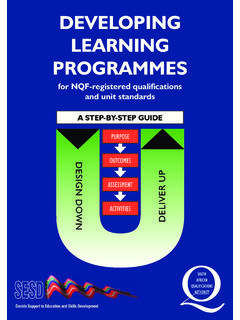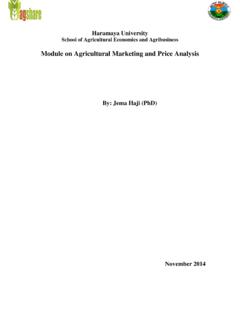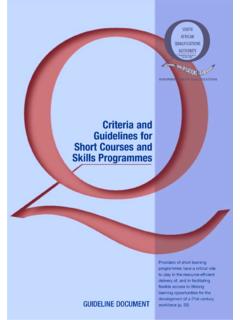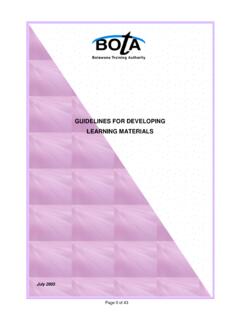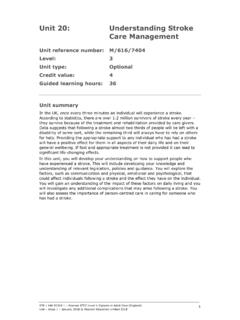Transcription of Learner support: a South African Programme Perspective
1 1 Learner support: a South African Programme Perspective Introduction In 1999, the South African Institute for Distance Education (SAIDE) undertook a research study into Learner support practices in South Africa. The research was motivated by SAIDE s own interest and various national policy documents calling for more and better Learner support. In many ways the study responded to two earlier publications and represented the continuation of an ongoing dialogue on Learner support practices.
2 In 1993, The Commonwealth of Learning published a series of case studies which offered insight into Learner support services within institutions in southern Asia (Sweet, 1993) and in 1998, the University of South Africa (UNISA) published a series of case studies which offered insight into the forms of Learner support offered by member states of the Distance Education Association of Southern Africa (Nonyongo & Ngengebule, 1998). The SAIDE study continues the debate at the level of individual South African programmes.
3 The guiding principle in the research that underpinned the study was to try to draw out useful lessons of experience from actual South African practice. The overall finding was that Learner support is now seen as an integral component of DE provision and should be included in all planning and budgeting right from the start. 1. Background to and rationale for the research Various policies converge on the centrality of Learner support and it is broadly agreed that it is necessary to provide Learner support in most educational programmes but in distance learning programmes in particular.
4 It has consistently been argued that ensuring learners have access to educational opportunities will not promote equality of educational opportunity unless Learner support is also offered. While it may be valid to claim that distance education has provided more access to groups who for a number of reasons cannot, or choose not to, enroll in traditional educational institutions, it is important to dispel the myth that access into educational institutions is synonymous with equal opportunities (King, 1994).
5 It is not adequate to simply enroll learners in courses and then not to offer them the support which could change access into success. In the South African context, a high percentage of learners are unlikely to succeed if they are admitted to distance education institutions but are not provided with adequate support. This is because of the poor quality of basic education for the majority of the population, which has been well documented. Paul (1991) found that an open admission policy without Learner support is insufficient to respond to the needs of disadvantaged learners in particular.
6 Although politically and legally the scenario in South Africa has changed, a large number of South Africans are still under-prepared and disadvantaged in relation to educational attainment, and the throughput rate for learners in distance education institutions has tended to be very low. Glennie (in Tait & Mills, 1996) sums up the reasons for the high failure and attrition rates by noting that: 2 Many learners undertaking distance education programmes at secondary and tertiary level do so on the basis of very negative experiences of education.
7 Their schools have operated sporadically, their educators have often been alienated, unmotivated, and authoritarian, and rote learning will have been the norm. The prospective learners are likely to lack many essential learning skills, and, in general, are underprepared. In light of the above, it becomes clear why Learner support should be seen as an integral part of any well functioning distance education or flexible learning Programme . Learner support has been perceived as one way of creating optimum conditions for success and enhancing the quality of educational provision.
8 It is seen as a critical factor in the transformation of the education system and the notion of Learner support is located within a clear commitment to equality of opportunity and the paramount importance of the needs of the Learner . Both in South Africa, and internationally, Learner support is increasingly being seen as integral to effective distance education courses. Tait (1995) observed that despite the financial limitations faced by distance education providers, institutions have demonstrated an increased awareness and commitment to the importance of providing Learner support.
9 Indeed, Learner support is seen as a critical factor in the transformation of the education system. Haasbroek (1995) reported that based on his extensive study of the literature, most successful distance education institutions throughout the world offer an element of support, usually involving interactive tuition and counseling. Although there is also a policy commitment to Learner support in South Africa, very little has been documented about the degree to which Learner support has in fact been implemented.
10 Furthermore, while policy offers an environment for planning, effective Learner support needs to be planned and implemented at the level of pedagogy and practice. Current policy documents do not venture into this domain, which SAIDE believes needs to be informed by on-going empirical research that can serve to sharpen legislation and policy. 2. Research methodology The research undertaken for this study was mainly empirical, and was informed by a literature review. The research presented is qualitative in nature and case study based in order to provide rich descriptions of Learner support activities.

